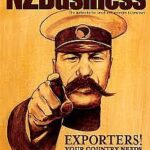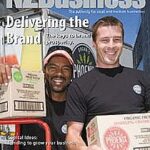Leading from the heart
Stressed-out executives and owner-operators can now access a program to give their lives new meaning and rejuvenate their businesses. Editor Glenn Baker talks to Steve Butler and Taryn Ellis, the proponents of leadership from within.
Stressed-out executives and owner-operators can now access a program to give their lives new meaning and rejuvenate their businesses. Editor Glenn Baker talks to Steve Butler and Taryn Ellis, the proponents of leadership from within.
Having a bad day at the office? Stress levels hitting the roof? Wondering if its all worth it or what else can be done?
Youre not alone. Business executives all over New Zealand may have acquired the Beemer, beach-house and flash BBQ, but sadly many have the high blood pressure to go with them.
Steve Butler and partner Taryn Ellis host seminars and facilitate one on one coaching that tackles the current crisis facing jaded business people, and have seen the result of business-induced stress all too often.
A typical scenario, says Ellis, could be the CEO running a multi-million dollar enterprise which has a growing turnover, but internal politics and power struggles threaten to bring everything crashing down. The CEO is at a loss in regard to handling relationships with certain board members or key stakeholders.
Another example is the owner-manager who must dismiss a desperately upset employee but has no idea how to handle the situation.
And Ellis says there are a vast number of business owners and managers with all the trappings of material success, but who are terribly trapped in their businesses. They feel that there is an enormous gap in their lives and are desperate to put some zing and zest back into it. Some have reached a level of success but really dont know what to do next.
The answer, in almost all cases, is to invest in ones self.
Working around the country, Butler and Ellis have developed an innovative professional development program that tackles leadership issues from within the person and encourages them to get in touch with their often untapped emotional side.
As Butler says, much has been written about the switch from IQ to EQ (emotional intelligence) in recent years. But often the approach to EQ is still intellect-based. Leaders are asked to complete forms, assessments and evaluations or to define goals and personal plans. This misses the point. EQ is about knowing and feeling, not thinking and doing.. EQ is more about coming from the heart.
Butler has devised an interactive model of integrated intelligencewhich the program is based on. It emphasises combining intellect and emotion more intelligently and maps a path to effective change. By inviting participation through self evaluation, it delivers a snapshot of exactly where people are at mentally, physically, emotionally and spiritually.
While people may find the emotional and spiritual aspect a little daunting initially, Butler says the integrated intelligence model is a real eye-opener as it provides people with something to benchmark themselves on and clearly shows how to demonstrate leadership from within..
Butler and Ellis (whose company is aptly named Be-Still) are so passionate about their leadership from within approach that they wont work with a company unless the CEO has first been through their professional development program. Effective change must be from the top. Then theres more chance the programs teachings will permeate right through all levels of the organisation.
Ellis says leadership from within is all about making the transition from being personally important through position, to being personally powerful by authenticity. In other words, so who you are as a person is completely in line with how you act or behave.
Complete one of Butlers 12-week coaching programs and you can expect to come out with a greater level of integrity, emotional stability and genuine self confidence so your external talk matches your private internal thinking. Your intent should also come from an attitude of love one of goodwill and good intention, and perhaps more importantly youll have an even greater appreciation for the power of cooperation.
Youll see where there is unity within your organisation and youll discover opportunities to work in a more connected way, says Ellis. Unity and connection is the ultimate goal, and its the opposite of the attitude of divide and rule or fear and separation that usually exists within an organisation.
Leadership from within leads to executives being comfortable enough to express their feelings more in the workplace, which equates to greater empathy and connection throughout the business. Growing self awareness is matched by an increased level of self responsibility that leads to personal and professional rewards such as improved communication skills, better relationships, focused decision making and much more fun and lightness whilst still getting the job done!
During the 12-week program Butler and Ellis encourage people to keep stepping forward effecting behavioural change is a gradual process and lasting change requires a three month transition. It wont happen overnight.
Celebrities, politicians, sports professionals, executives and high profile business people have all benefited from Be-Stills professional development program. And both Butler and Ellis have a goal to reach New Zealands key influencers, so the whole nation will benefit.
Its for anyone with any degree of self awareness, says Butler. Anyone interested in taking a look at how they are doing in relation to others around them.
He says there is a plethora of how to logic-based seminars and coaching programs out there for business people, but few, if any, equip them to make the necessary changes physically, mentally, emotionally and spiritually to have any lasting impact.
Breaking down limitations
How you measure success also comes in for scrutiny during the program. Many people want to move beyond material success and experience better relationships, more intimacy, more time together, perhaps have more holidays.People create limitations around themselves in such areas as time, money, and resources, says Ellis. Although they think much of this is beyond their control, we show them how to be proactive by choosing what they want to change and how they wish to participate. Often we can get them doing things immediately; its like they were waiting for us to give them permission.
She says taking that first step can be perceived as a risk, but once it is done they realise that it wasnt a risk at all.
Challenge any status quo is the mantra of Butler and Ellis while conducting their program. Not because people necessarily need to change the way things are, says Butler, but because in being invited to test it, they see if theyre sure it should stay that way.
Question everything, says Ellis, because there just might be a better way, a better supplier for example, if certain perceptions are shattered.
Expect to be changed when you participate in a Be-Still program expect a transformation in yourself and your business that comes from understanding what its like to live from integrated intelligence. And instead of applying leadership from external logic, expect to demonstrate leadership from within.
It all begins when you breathe in breath out and be still. NZB



